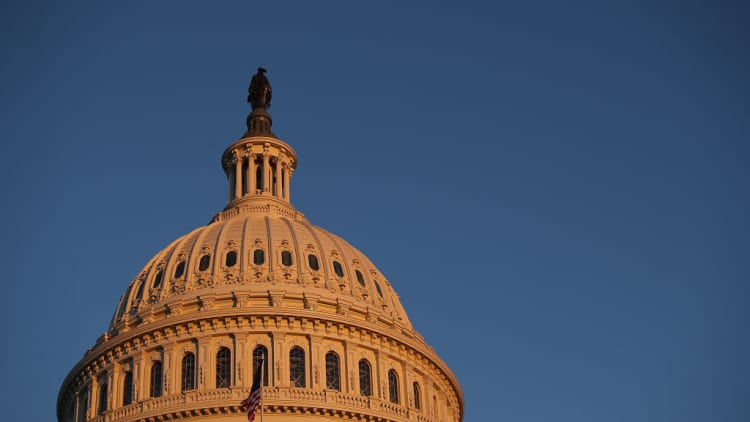
Congressional leaders released a massive $1.3 trillion government spending bill on Wednesday night after striking agreement on some major points of contention.
Lawmakers will now rush to pass the legislation to keep the government running through September by the midnight Friday deadline to avoid the third government shutdown this year.
The House Rules Committee was set to meet Wednesday night, setting up a possible Thursday vote on the more than 2,200 page bill in the chamber. Earlier Wednesday, a GOP aide was noncommittal when CNBC asked whether the House would vote on the measure Thursday.
The proposal would boost funding for the military and border security technology, two major Republican priorities. It would also increase funds to fight the opioid epidemic and improve U.S. infrastructure. Other provisions include measures meant to improve gun sale background checks and school safety.
Easing Trump's concerns
President Donald Trump, who was hesitant to support the proposal entering Wednesday, backs the spending bill, the White House said in a statement earlier Wednesday. He talked Wednesday afternoon with Senate Majority Leader Mitch McConnell and House Speaker Paul Ryan, who aimed to ease his concerns. The GOP leaders discussed the "shared priorities secured" in the legislation, such as defense spending and funding for fencing on the U.S. border with Mexico, the White House said.
In a statement earlier Wednesday, Ryan spokesman Doug Andres reiterated the president's support, saying the Wisconsin Republican and Trump "had a good conversation about the wins delivered for the president." After the bill's release, Ryan promoted it as a boost for the military, saying it "fulfills our pledge to rebuild the United States military." In another sign of Ryan's effort to win support from the president and his conservative members, his office said he would appear Thursday morning on "Fox and Friends," a show Trump watches and famously tweets about.
Democrats claim victory, too
Democrats touted policy victories of their own in the plan, despite concessions they made to the GOP.
"Every bill takes compromise, and there was plenty here, but at the end of the day we Democrats feel very good because so many of our priorities for the middle class were included," Senate Minority Leader Chuck Schumer said in a statement. "From opioid funding to rural broadband, and from student loans to child care, this bill puts workers and families first."
The House was expected to start gauging how its members would vote on the proposal on Wednesday night. The bill faces opposition from the conservative wing of the Republican Party, whose lawmakers object to the spending increases.
Still, support from most of the majority Republicans and minority Democrats could overcome the GOP opposition.
Last month, Congress reached a deal to bust through budget caps and increase military and domestic spending by $300 billion over two years. The legislation this week would actually allocate the money to specific programs and agencies.
Disagreements over issues such as immigration, health care and infrastructure slowed the funding talks and left lawmakers scrambling to beat the Friday deadline.
Here are some of the bill's notable provisions:
- It would boost Department of Defense funding by nearly $80 billion, the largest increase in 15 years, according to lawmakers. That includes a 2.4 percent pay increase for the military.
- It would put $1.57 billion in new funding toward fencing along the border with Mexico and border security technology such as aircraft and sensors. Trump had sought billions more in funding for a physical barrier on the border after he promised to build a wall as a candidate. He proposed the border money in exchange for legal protections for hundreds of thousands of young undocumented immigrants, but Democrats did not budge.
- The legislation would allocate billions in new funding toward opioid abuse treatment, prevention and research. Overall, it would put $4 billion toward those efforts.
- The bill would put more than $10 billion more toward infrastructure projects to improve highways, airports, railroads and bridges. It will also put money toward high-speed broadband development. It would not directly fund a rail tunnel from New Jersey to New York that Trump opposed. But the project would be eligible for funding from programs that are getting a boost in the bill.
- It would include a provision to improve the gun sale background check system, by pushing agencies to better follow existing procedures for the National Instant Criminal Background Check System. The so-called Fix NICS bill had bipartisan support.
- The proposal would put more than $2 billion in new money toward mental health and school safety programs.
- The legislation would adjust an issue from the GOP tax bill passed in December that helped agricultural cooperatives relative to corporate competitors. In return, Democrats secured an expansion of the low-income housing tax credit.
- The bill would not include measures to shore up Affordable Care Act health insurance marketplaces, as some Republicans and Democrats hoped. It also would not pull funding for so-called sanctuary cities or Planned Parenthood, as some conservatives had hoped.


